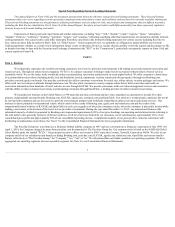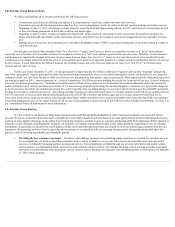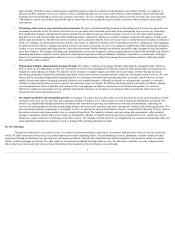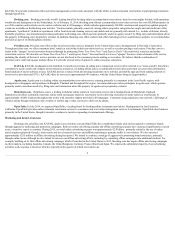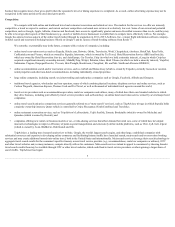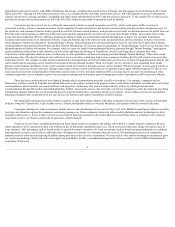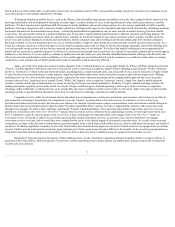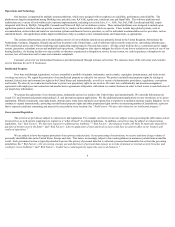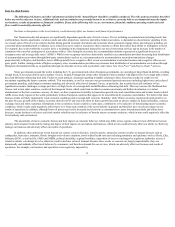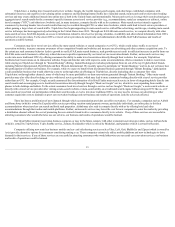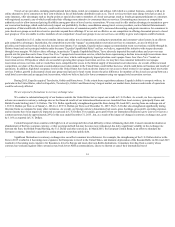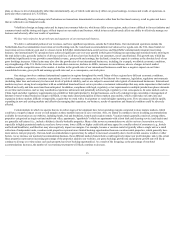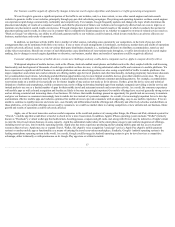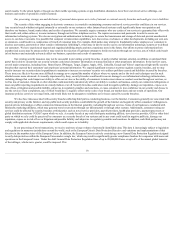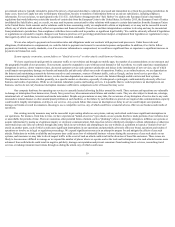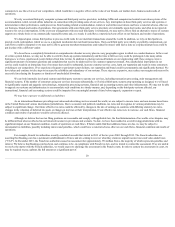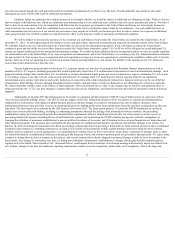Priceline 2015 Annual Report Download - page 14
Download and view the complete annual report
Please find page 14 of the 2015 Priceline annual report below. You can navigate through the pages in the report by either clicking on the pages listed below, or by using the keyword search tool below to find specific information within the annual report.
Item 1A. Risk Factors
The following risk factors and other information included in this Annual Report should be carefully considered. The risks and uncertainties described
below are not the only ones we face. Additional risks and uncertainties not presently known to us or that we currently believe are immaterial may also impair
our business, results of operations or financial condition. If any of the following risks occur, our business, financial condition, operating results and cash
flows could be materially adversely affected.
Declines or disruptions in the travel industry could adversely affect our business and financial performance.
Our financial results and prospects are significantly dependent upon the sale of travel services. Travel, including accommodation (including hotels, bed
and breakfasts, hostels, apartments, vacation rentals and other properties), rental car and airline ticket reservations, is dependent on discretionary spending levels.
As a result, sales of travel services tend to decline during general economic downturns and recessions when consumers engage in less discretionary spending, are
concerned about unemployment or inflation, have reduced access to credit or experience other concerns or effects that reduce their ability or willingness to travel.
For example, the recent worldwide recession led to a weakening in the fundamental demand for our travel reservation services and an increase in the number of
consumers who canceled existing travel reservations with us. Also during the recession, the accommodation industry experienced a significant decrease in
occupancy rates and average daily rates ("ADRs"). While lower occupancy rates have historically resulted in accommodation providers increasing their distribution
of accommodation reservations through third-party intermediaries such as us, our remuneration for accommodation reservation transactions changes
proportionately with price, and therefore, lower ADRs generally have a negative effect on our accommodation reservation business and a negative effect on our
gross profit. Further, during periods of higher occupancy rates, accommodation providers may decrease their distribution of accommodation reservations through
third-party intermediaries like us, in particular through our discount services such as priceline.com's Name Your Own Price ® and Express Deals ® services.
Many governments around the world, including the U.S. government and certain European governments, are operating at large financial deficits, resulting
in high levels of sovereign debt in such countries. Greece, Ireland, Portugal and certain other European Union countries with high levels of sovereign debt at times
have had difficulty refinancing their debt. Failure to reach political consensus regarding workable solutions to these issues has resulted in a high level of
uncertainty regarding the future economic outlook. This uncertainty, as well as concern over governmental austerity measures including higher taxes and reduced
government spending, could impair consumer spending and adversely affect travel demand. Greece, in particular, has recently faced and continues to face
significant economic challenges, in large part due to its high levels of sovereign debt and difficulties re-financing that debt. This may increase the likelihood that
Greece, and in turn other countries, could exit the European Union, which could lead to added economic uncertainty and further devaluation or eventual
abandonment of the Euro common currency. At times, we have experienced volatility in transaction growth rates and cancellation rates and weaker trends in hotel
ADRs across many regions of the world, particularly in those European countries that appear to be most affected by economic uncertainties. We believe that these
business trends are likely impacted by weak economic conditions and sovereign debt concerns. Similarly, while China's economy experienced rapid growth over
the past 20 years, growth of the Chinese economy slowed in 2015 and concerns about its future growth have had an adverse impact on financial markets, currency
exchange rates and other economies. Disruptions in the economies of such countries could cause, contribute to or be indicative of deteriorating macro-economic
conditions, which in turn could negatively affect travel to or from such countries or the travel industry in general and therefore have an adverse impact on our
results of operations. In addition, although lower oil prices may lead to increased travel activity as consumers have more discretionary funds and airline fares
decrease, recent declines in oil prices and stock market volatility may be indicative of broader macro-economic weakness, which in turn could negatively affect the
travel industry and our business.
The uncertainty of macro-economic factors and their impact on consumer behavior, which may differ across regions, makes it more difficult to forecast
industry and consumer trends and the timing and degree of their impact on our markets and business, which in turn could adversely affect our ability to effectively
manage our business and adversely affect our results of operations.
In addition, other unforeseen events beyond our control, such as oil prices, terrorist attacks, unusual or extreme weather or natural disasters such as
earthquakes, hurricanes, tsunamis, floods, droughts and volcanic eruptions, travel-related health concerns including pandemics and epidemics such as Ebola, Zika,
Influenza H1N1, avian bird flu, SARS and MERS, political instability, regional hostilities, imposition of taxes or surcharges by regulatory authorities or travel-
related accidents, can disrupt travel or otherwise result in declines in travel demand. Because these events or concerns are largely unpredictable, they can
dramatically and suddenly affect travel behavior by consumers, and therefore demand for our services, which can adversely affect our business and results of
operations. For example, our business and operations were negatively impacted by
11


